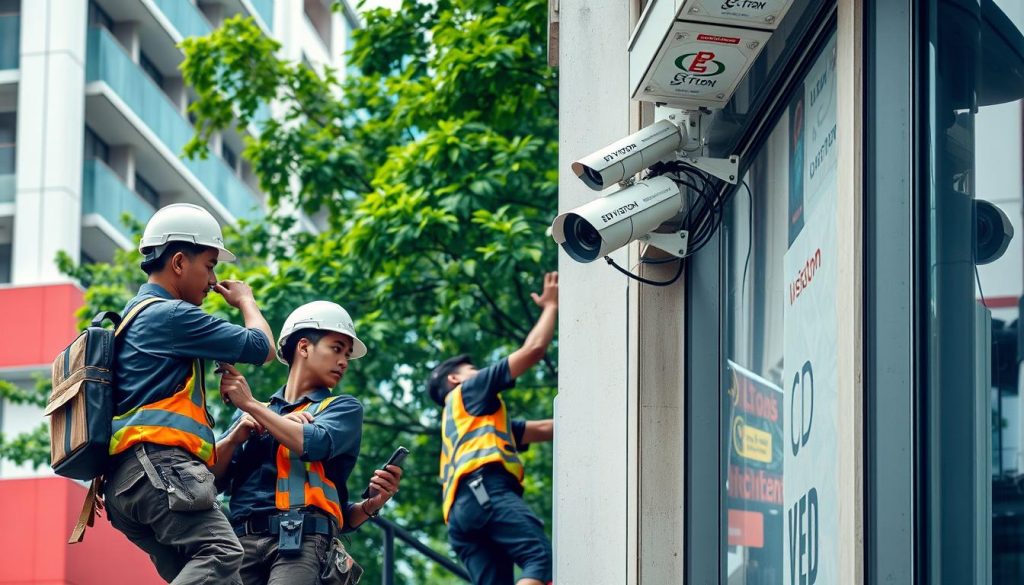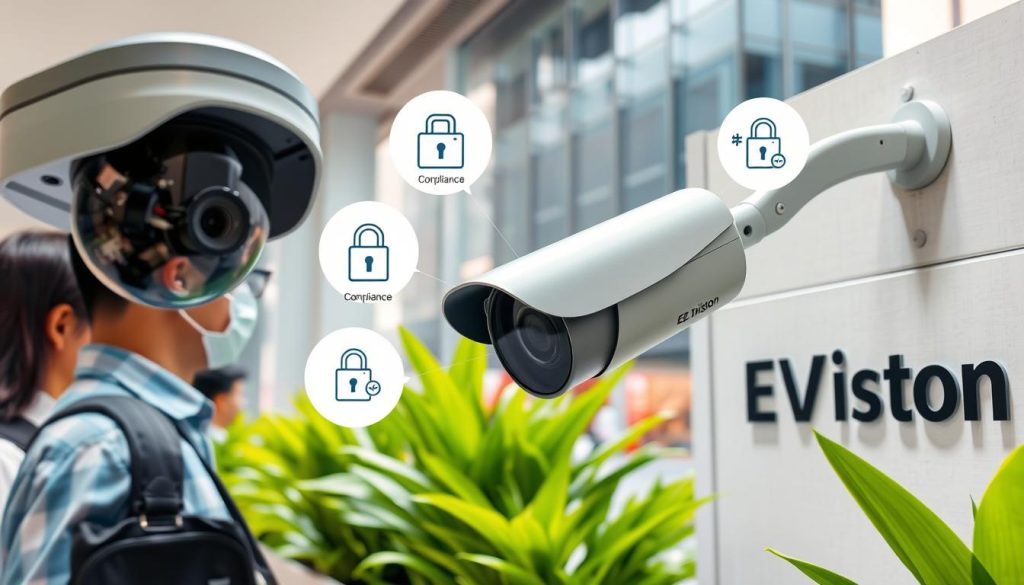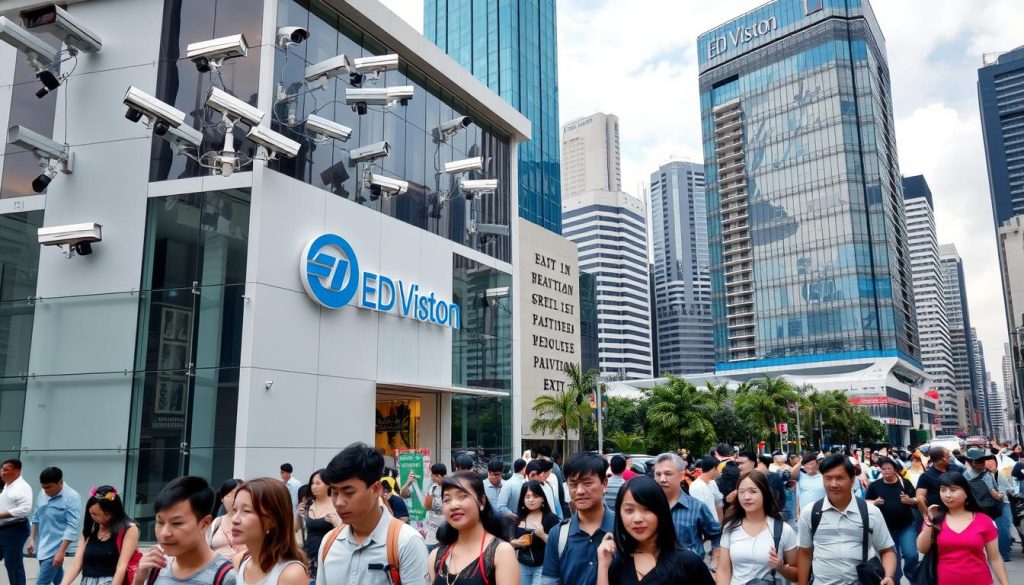Ever wondered who manages the many CCTV cameras in Singapore? As surveillance tech spreads, knowing who’s in charge is key. This article will look into who’s accountable for CCTV cameras in homes and businesses. We’ll cover everything from setting up cameras to watching them and following the law.
With over 500,000 CCTVs installed by First Solution Group, it’s important to know who’s in charge. This is a big part of keeping cities safe.
Key Takeaways
- Understanding CCTV security system owner responsibilities is key.
- Cameras must be placed and used correctly, following rules.
- Breaking Town Council rules can lead to big fines.
- The Personal Data Protection Act (PDPA) sets rules for CCTV data.
- People have the right to see their personal data.
- Companies must have data policies and follow them.
- Contact ED Viston today at +65 8313 4578 for the latest CCTV info & deals!
Understanding CCTV Cameras in Singapore
CCTV technology is key to keeping Singapore safe and secure. It helps businesses and homes feel secure. With crime rates rising, using CCTV has become more important than ever.
There are many types of CCTV cameras. Dome cameras have high resolutions and infrared night vision. Bullet cameras have strong zooms and are weatherproof. PTZ cameras offer 360-degree views.
Modern CCTV systems use advanced tech. Businesses can watch footage on mobiles, responding fast in emergencies. High-quality footage helps catch thieves and trespassers.
CCTV monitoring also keeps employees on track. It reduces unauthorized access and slacking. Smart surveillance systems send real-time alerts and analytics. Investing in good CCTV tech is essential for homes and businesses in Singapore.
Want to check out the latest CCTV solutions and deals? Call ED Viston today at +65 8313 4578.
The Importance of CCTV Cameras for Security
CCTV cameras are key to keeping places safe. They help in both public and private areas. Studies show they can lower crime rates by a lot.
Properties with CCTV cameras see less crime. This helps in preventing crimes overall. It’s a big win for safety.
Many studies back up CCTV cameras’ effectiveness. In cities, crime went down by 7%. Public transit saw a 23% drop in crime. Parking lots saw a 51% crime reduction.
CCTV cameras are not just a deterrent. They also help solve crimes. Footage can be used as evidence in court. This shows how important they are for community safety.
Privacy concerns are valid. But, most people support CCTV cameras. A New York Times/CBS poll found 78% of people okay with them in public.
Using CCTV cameras shows a strong commitment to safety. If you’re thinking about getting them, know their benefits. They’re a big help in keeping everyone safe.
Contact ED Viston today at the phone number +65 8313 4578 to find out more about the latest CCTV solutions & offers.
Who is responsible for CCTV camera?
In Singapore, the owners of CCTV systems are mainly responsible. They must follow local laws and regulations. A security camera administrator has to manage CCTV monitoring well. This includes keeping the equipment in good shape and respecting privacy and laws.
CCTV security system owner accountability
Owners of CCTV systems must keep their systems running right. They need to make sure all gear works and is installed correctly. They also need the right permits for installation. It’s key to know the legal side of using video footage to avoid trouble.
Legal obligations of CCTV installation
There are strict rules for installing CCTV cameras. Owners must follow the Personal Data Protection Act (PDPA) and get consent for recording people. They also can’t spy on people without a good reason. Knowing these rules is critical for the security camera administrator.
If you need help with your CCTV system, ED Viston can help. Call +65 8313 4578 to learn more about CCTV solutions and deals.
Benefits of CCTV Surveillance Systems
CCTV surveillance systems have many advantages for organizations and property owners. They help deter crime, reducing theft by up to 30%. This makes places safer and more secure.
CCTV systems also help in solving crimes by providing evidence. They increase the success rate of investigations. Businesses see them as a way to avoid lawsuits, thanks to clear evidence.
Having CCTV cameras also improves workplace safety. It leads to fewer accidents and boosts employee morale. This shows how CCTV systems benefit workplaces.
For customers, CCTV systems mean safer shopping. They can make people feel more secure and happy. This shows the advantages of CCTV in improving business and customer trust.
Investing in CCTV technology can be a smart move. The global IP camera market is expected to grow a lot. In Singapore, the demand for surveillance camera benefits is high, making it a good time to invest.
To learn more about CCTV surveillance, contact ED Viston today at +65 8313 4578. Find out about the latest CCTV solutions and special offers to improve your security.
Key Legal Frameworks Surrounding CCTV Usage
It’s important to know the laws about CCTV in Singapore. This is true for both individuals and companies. Following these rules makes sure surveillance is fair and legal. We need to look at the Personal Data Protection Act (PDPA) and the rules for HDB properties.
Personal Data Protection Act (PDPA)
The PDPA sets key rules for CCTV use. It says you need consent to record video. You must tell people how their data will be used.
Cameras should only record what they need to. They should also be clear to help stop illegal acts.
How long you keep footage is also important. You can only keep it as long as you need to. If there’s a data leak, you must act fast. This includes protecting the data and telling those affected.
Following these rules helps protect privacy. It also builds trust in the community.
Town Council Regulations for HDB Properties
There are special rules for CCTV in HDB homes. You need a permit to install cameras. These rules cover where cameras can go and how they affect privacy.
It’s a good idea to check these rules often. This makes sure your cameras are always legal.
Knowing about PDPA and HDB rules is key for using CCTV systems right. For more info on legal CCTV use, contact ED Viston at +65 8313 4578. They offer the latest in CCTV tech and deals.
Installation Requirements for CCTV Cameras in Singapore
Knowing the CCTV installation requirements in Singapore is key for everyone. Homeowners can put up CCTV cameras without needing permits. But, there are rules about where you can install them, like in HDB flats’ common areas. Installing them right is important to avoid fines, which can be up to $10,000. You could even face jail time for illegal installations.
When setting up a surveillance camera setup, getting consent for personal data is usually needed. It’s also important to tell people that they’re being watched with signs. Following the Personal Data Protection Act (PDPA) is a must, including how to store and delete footage properly.
The person in charge of the property must get town council approval for CCTV cameras. It’s a good idea to check the footage often to stay legal. With CCTV cameras becoming more common in businesses, following these rules is even more important.
Good cable management and a steady power supply are also key. They help your system work well and meet legal CCTV installation requirements. This also helps protect your property and privacy.
For expert advice on CCTV solutions and deals, call ED Viston at +65 8313 4578.

Roles and Responsibilities of CCTV System Owners
CCTV system owners are key to effective security camera management. They oversee all CCTV operations, including monitoring and setting standards. This ensures the system meets legal and ethical standards. It’s important for both personal and public safety.
CCTV monitoring oversight
CCTV operators manage many feeds, often watching up to 15 screens at once. Their skills in observation and quick thinking are vital in emergencies. They support law enforcement by providing access to recordings when needed.
They need extensive training to keep high standards of observation and quick response to dangers.
CCTV camera management standards
Meeting international management standards is key for a CCTV system’s integrity. Owners must follow the Data Protection Act 2017 and GDPR. They also conduct regular audits to keep policies in check.
- CCTV footage retention is generally set at a minimum of 30 days.
- Access to recorded material is strictly controlled, limited to specific entities for defined purposes.
- Accountability measures include designated roles such as the Head of Residences and Facilities, who manages the overall operation.
- Regular assessments ensure that there is no negative impact on individuals based on protected characteristics.
Strong security measures, like secure storage and access control, enforce these standards. Keeping detailed records and conducting regular checks ensures the system’s effectiveness. It also builds trust in the community.
To explore CCTV solutions tailored to your needs, contact ED Viston today at +65 8313 4578. They offer the latest in surveillance technology.
Compliance and Data Retention Guidelines
It’s key for companies in Singapore to know about CCTV system rules. These rules make sure data retention policies follow the law. This protects both the company and people’s privacy. Companies need to figure out how long to keep CCTV footage.
The Personal Data Protection Act (PDPA) sets rules for how long data can be stored. It also says when data can be deleted.
Handling surveillance data means following CCTV compliance rules to keep it safe. Companies should use strong security to protect footage. Checking storage regularly helps find and fix any weak spots in surveillance data management.
Using CCTV can be tricky for different industries. For example, healthcare and finance have their own rules. Breaking these rules can lead to big fines.
Companies should make clear rules for handling CCTV. Training staff on these rules helps keep everyone safe. Also, telling people when they’re being watched helps everyone know what’s going on.
| Guideline | Description |
|---|---|
| Data Retention Duration | Footage should be kept only as long as needed. |
| Access Controls | Make sure only the right people can see footage. |
| Training Programs | Keep training staff on following the rules. |
| Notification Requirements | Show signs that CCTV is being used. |
| Footage Requests | Have clear rules for when footage can be shared. |
To learn more about improving your security and following these rules, check out Wenhong’s CCTV solutions. They offer new ways to manage surveillance data while staying legal.
For more info on CCTV solutions and deals, call ED Viston at +65 8313 4578.

Conclusion
Understanding CCTV camera management is key for system owners. Following laws like the Personal Data Protection Act (PDPA) is important. It makes sure surveillance is both effective and legal.
By balancing security and legal rules, owners can create a safer space. This way, they handle their duties well.
Safe surveillance practices are also essential. They prevent CCTV misuse and protect privacy. Big incidents worldwide show CCTV’s role in catching criminals and stopping crimes.
Looking to boost your security? Reach out to ED Viston at +65 8313 4578. They offer the latest CCTV solutions and custom plans for your needs.
FAQ
Who is generally responsible for the management of CCTV cameras in Singapore?
What are the primary functions of CCTV cameras?
How do CCTV cameras help in crime prevention?
What are the legal obligations for installing CCTV cameras?
What are the benefits of using CCTV surveillance systems?
What does the PDPA require regarding CCTV footage?
What installation requirements must be followed for CCTV cameras in Singapore?
What are the responsibilities of a CCTV system controller?
What compliance guidelines exist for CCTV data retention?
Source Links
- https://www.firstsolution.com.sg/blog/how-to-legally-install-cctvs-in-singapore/
- https://www.ismartcom.com/blog/pdpa-compliance-and-cctv-surveillance-legal-considerations-in-singapore/
- https://ktree.com.sg/industry/security-cctv-cameras-privacy-invasion/
- https://www.d-ron.com/articles/cctv-cameras-in-singapore-for-offices/
- https://www.cctv-camera.com.sg/articles/do-you-need-permission-to-install-cctv.html
- https://coruzant.com/security/navigating-the-legalities-of-cctv-installation-in-singapore/
- https://lodgeservice.com/the-top-9-benefits-of-cctv-security-protecting-people-and-property/
- https://journalistsresource.org/politics-and-government/surveillance-cameras-and-crime/
- https://xpressguards.com/are-security-guards-responsible-for-monitoring-security-cameras/
- https://en.wikipedia.org/wiki/Closed-circuit_television
- https://web.securitysystem.com.sg/benefits-of-cctv-camera-for-businesses/
- https://www.buildingsecurity.com/blog/cctv-vs-ip-cameras/
- https://getmedigital.com/blog/cctv-cameras-privacy-laws/
- https://installersph.com/the-legal-and-ethical-considerations-of-using-cctv-cameras/
- https://web.securitysystem.com.sg/cctv-camera-for-hdb-flat/
- https://www.privacy.com.sg/resources/4-tips-installing-cctvs-legally/
- https://www.kingdom.co.uk/blog/what-are-the-duties-and-responsibilities-of-a-cctv-operator
- https://fxplus.ac.uk/wp-content/uploads/2024/02/CCTV-Policy.pdf
- https://gammamaterials.mu/content/12-cctv-policy
- https://www.police.gov.sg/-/media/Spf/Files/E-services/AE-Request-Forms/Safety-and-security-guidelines-For-EP.ashx
- https://www.progress.com/blogs/cctv-is-a-data-compliance-issue
- https://www.pdpc.gov.sg/-/media/Files/PDPC/PDF-Files/Advisory-Guidelines/AG-on-Selected-Topics/Advisory-Guidelines-on-PDPA-for-Selected-Topics-310322.ashx?la=en
- https://medium.com/@techboy7823/solving-crimes-with-cctv-real-life-success-stories-efb7fdf0d9f9
- https://www.farsight.co.uk/blog/the-advantages-of-using-cctv-cameras-in-schools/
- https://www.justice.act.gov.au/safer-communities/security-and-emergency-management/public-safety-closed-circuit-television-network

